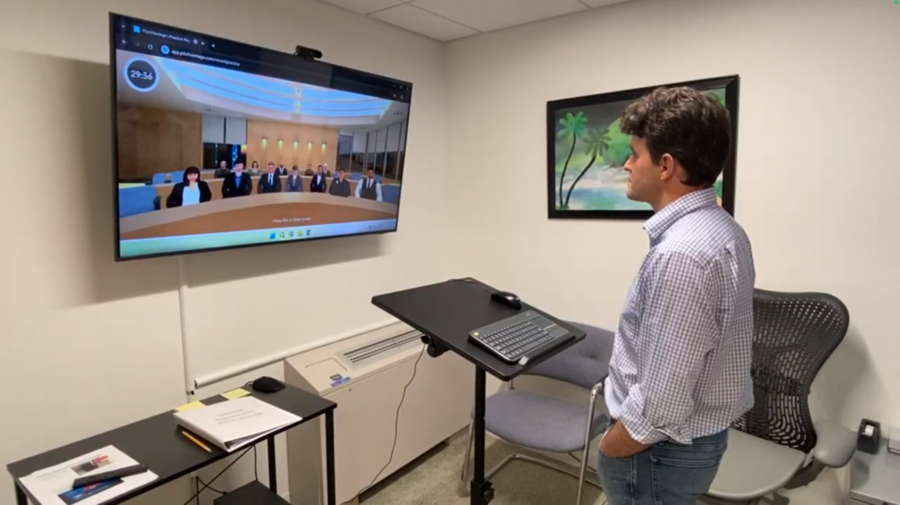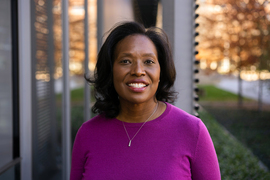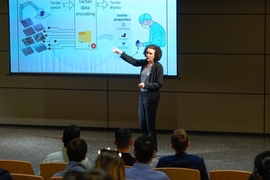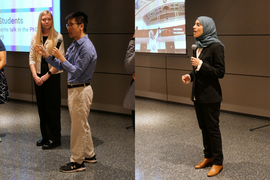For students, postdocs, and early-career researchers, communicating complex ideas in a clear and compelling manner has become an essential skill. Whether applying for academic positions, pitching research to funders, or collaborating across disciplines, the ability to present work clearly and effectively can be as critical as the work itself.
Recognizing this need, The MIT Office of Graduate Education (OGE) has partnered with the Writing and Communication Center (WCC) to launch the WCC Communication Studio: a self-service recording and editing space designed to help users sharpen their oral presentation and communication skills. Open to all members of the MIT community as of this fall, the studio offers a first-of-its-kind resource at MIT for developing and refining research presentations, mock interview conversations, elevator pitches, and more.
Housed in WCC’s Ames Street office, the studio is equipped with high-quality microphones and user-friendly video recording and editing tools, all designed to be used with the PitchVantage software.
How does it work? Users can access tutorials, example videos, and a reservation system through the WCC’s website. After completing a short orientation on how to use the technology and space responsibly, users are ready to pitch to simulated audiences, who react in real time to various elements of delivery. Users can also watch their recorded presentations and receive personalized feedback on nine elements of presentation delivery: pitch, pace, volume variability, verbal distractors, pace, eye contact, volume, engagement, and pauses.
Designed with students in mind
“Through years of individual and group consultations with MIT students and scholars, we realized that developing strong presentation skills requires more than feedback — it requires sustained, embodied practice,” explains Elena Kallestinova, director of the WCC. “The Oral Communication Studio was created to fill that gap.”
Those who have used the studio during its initial lifespan say that its interactive format helps to provide real-time, actionable feedback on their verbal delivery. Additionally, the program offers notes on overall stage presence, including subtle actions such as hand gestures and eye contact. For students, this can be the key to ensuring that their delivery is both confident and clearly accessible once it comes time to present.
“I’ve been using the studio to practice for conferences and job interviews,” says Fabio Castro, a PhD student studying civil engineering. His favorite feature? The instant feedback from the virtual figures watching the presentation, which allows him to not only prepare to speak in front of an audience, but to read their nonverbal cues and adjust his delivery accordingly.
The studio also addresses a practical challenge facing many PhD students and postdocs in their role as emerging researchers: the high stakes of presenting. For many, their first major talk may be in front of a hiring committee, research institute, or funding body — audiences that may heavily influence their next career step. The studio gives them a low-pressure environment in which to rehearse so that they enter these spaces confidently.
Aditi Ramakrishnan, an MBA student in the MIT Sloan School of Management, acknowledges the importance of this tool for emerging professionals. As a business student, she explains, “a lot of your job involves pitching.” She credits the WCC with helping to take her pitching game “from good to excellent,” identifying small details such as unnecessary “filler” words and understanding the difference between a strong stage presence and a distracting one.
A new frontier in communication support at MIT
While MIT has long been recognized for its excellence in technical education, the studio represents a broader focus on arming students and researchers alike with the tools that they need to amplify their work to larger audiences.
“The WCC Communication Studio gives students a place to rehearse, get immediate feedback, and iterate until their ideas land clearly and confidently,” explains Denzil Streete, OGE’s senior associate dean and director. “It’s not just about better slides or smoother delivery; it’s about unlocking and scaling access to more modern tools so more graduate students can translate breakthrough research into real-world impact.”
"The studio is a resource for the entire MIT community,” says Kallestinova, emphasizing that this new resource serves as a support for not only graduate students, but also undergrads, researchers, and even faculty. “Whether used as a supplement to classroom instruction or as a follow-up to coaching sessions, the studio offers a dedicated space for rehearsal, reflection, and growth, helping all users build confidence, clarity, and command in their communication."
The studio joins an array of existing resources within the WCC, including a Public Speaking Certificate Program, a peer-review group for creative writers, and a number of revolving workshops throughout the year.
A culture of communication
From grant funding and academic collaboration to public outreach and policy impact, effective speaking skills are more important than ever.
“No matter how brilliant the idea, it has to be clearly communicated by the researcher or scholar in order to have impact,” says Amanda Cornwall, associate director of graduate student professional development at Career Advising and Professional Development (CAPD).
“Explaining complex concepts to a broader audience takes practice and skill. When a researcher can build confidence in their speaking abilities, they have the power to transport their audience and show the way to new possibilities,” she adds. “This is why communication is one of the professional development competencies that we emphasize at MIT; it matters in every context, from small conversations to teaching to speeches that might change the world.”
The studio’s launch comes among a broader institutional focus on communication. CAPD, the Teaching and Learning Lab, the OGE, and academic departments have recognized the value of, and provided increasing levels of support for, professional development training alongside technical expertise.
Workshops already offered by the WCC, CAPD, and other campus partners work to highlight best practices for conference talks, long-form interviews, and more. The WCC Communication Studio provides a practical extension of these efforts. Looking ahead, the studio aims to not only serve as a training space, but also help foster a culture of communication excellence among researchers and educators.









